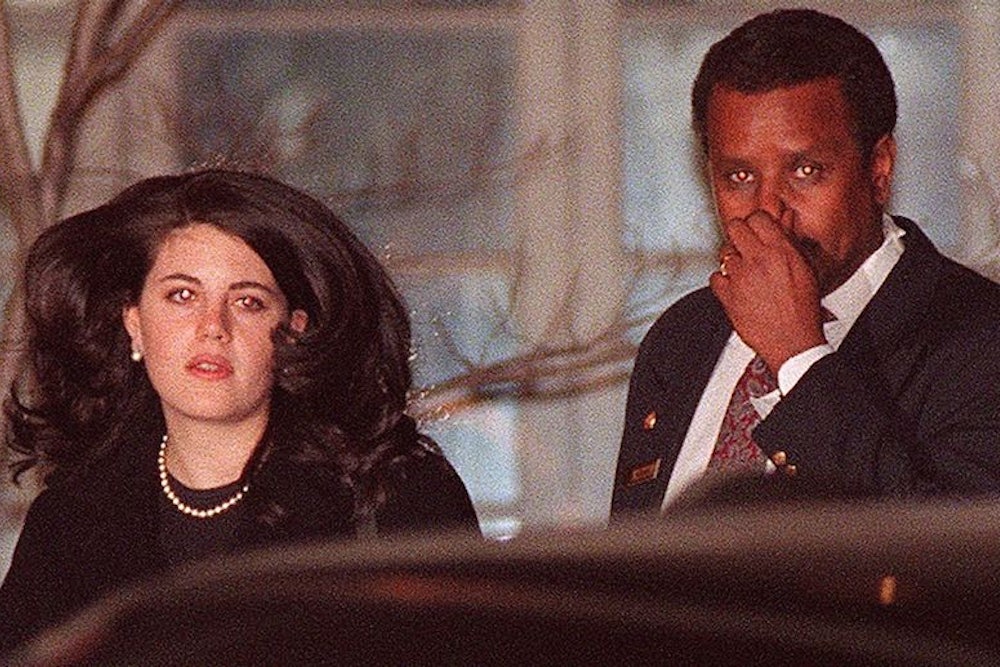You’re straining to see over the heads of about a million reporters seeding the White House lawn, but you’re not sure what there is to see. There is a limo parked right up to the curb, and you imagine maybe Monica will step out in her trench coat, like she did last night on TV. Instead, the door to the Roosevelt Room swings open, and Senator Dianne Feinstein steps out. (Or is that Barbara Boxer?) The press octopus makes a lunge for her, but the tiny figure in lavender merely smiles, chirps “See ya later” and disappears into the shiny car. It’s cold, and you wish you were home watching Monica on TV.
A sudden commotion crashes behind you as another octopus rumbles toward the press room—this one in pursuit of one of its own, the recently unshackled Sam Donaldson. In the endless stretches between pointless White House briefings, Donaldson performs for his colleagues, who record him with their eager cameras. He moves jerkily, like a jack-in-the-box, an effect enhanced by the plastic coil springing out of his ear. “Stick it in my ear. Stick it in your ear,” he says to his helper. Donaldson then drops his pen and scrambles for it. “Excuse me, I’m from Puerto Rican television,” he says upon rising.
You overhear an aide to Erskine Bowles complain bitterly that “the glee is really stomach-turning.” She’s referring to the press, but she can’t possibly mean the regulars, who are sleepless and grumpy and trapped like jailbirds with nothing to chew on but scraps. She must mean the cameramen. They are also working overtime, but at least they are getting paid for it. One of the CNN crewmen shipped in from Atlanta brags he’s earned at least $1,000 in overtime and hardship pay. They get to talking about the Super Bowl, then one of them comes up with a brilliant idea: Put the overtime money into a pool, guessing what day Clinton will resign. The pool, he says proudly, will be called “Death Blow.” His friend looks dubious and suggests they bet instead on how many times press spokesman Mike McCurry will duck the question of what exactly Clinton means by “sexual relationship,” using some formulation like “asked and answered.” They settle on the latter.
“Five minutes till briefing,” announces a disembodied voice, and the cameramen sprint into place. Will the president provide more details, one reporter asks. “Certainly,” answers McCurry. When? “At the proper point.” Does no sexual relations mean no sexual intercourse? “I’m not going to dignify that question.” “I don’t want to get into, you know. ...” “I can’t.” “I have not.” At one point, loopy Sarah McClendon, the oldest living White House reporter, shrieks, “Why did he give her a dress?”—a very good question, even if she did ask twice. “Sarah, I’m not in a position here to deal with that question.” The cameramen count 32 total evasions. The highest guess prior to the briefing was 25.
Next day. It’s the mad spin session after the State of the Union, and this time there are hundreds of people dying to answer questions. Only no one’s actually mentioning Monica by name. Instead, the spinners speak of the “distraction factor,” the “troubles,” or the “irritation,” depending on what side they’re on. The most popular phrase seems to be the “allegations swirling about,” accompanied by an index finger swirling about the ear.
The star of the evening is Bob Barr, the representative from Georgia who was pushing impeachment proceedings against Clinton long before the “troubles.” During the entire hour-long speech, Barr did not clap or budge from his seat once. If he moved, it was to scratch his shoulder or blink hard, adopting the minor tics of the self-styled house madman. “I have respect for the presidency, but I have no respect for the individual in that office,” he sulks. “You can only stand and applaud for a person you respect.” Later you see him standing behind Sam Donaldson, who is standing on top of a plastic box. “I have no respect for the ...” Barr tells another reporter. Donaldson, meanwhile, now has plastic coils sprouting from all over his body, down his pants and through his legs and wrapped around his feet. He is pivoting back and forth on the box saying nothing, like the South Street seaport mime.
A man with a beard is sticking a plastic coil behind your ear. “Five, four, three, two, one—Welcome to Geraldo!” says Geraldo, and introduces an endless list of guests, among them “Hannah Roslyn at our studio in Washington.” You wonder whether to bother correcting him. The New York audience whoops and cheers and whistles into your plastic coil. You can hear them, but all you can see in this dark and lonely Washington studio is a black camera lens above a pair of legs. At one point, a woman weeps that Clinton got her pregnant and tacitly encouraged her to get an abortion. (Is she a guest or a news clip?) The studio audience hisses into your coil. Geraldo’s resident psychiatrist says Clinton is obviously a “sex addict,” that he and Hillary are “codependent.” But it’s okay, he just needs “help.” Cheers fill the coil.
The man with a beard whispers to jump in when you feel like it. “Be aggressive,” he says. You think frantically about how you can make the coil cheer. The other Washington guest, Democratic consultant Jennifer Laszlo, goes first. “What the president should be worrying about is not Paula Jones, but Dow Jones.” You know you’ve heard that before, but where? Finally, you come up with the perfect sentence. “Geraldo, Geraldo.” You speak into the dark room. Silence. “Geraldo. Wash here,” says the cameraman. Silence again. The coil is dead.
